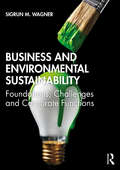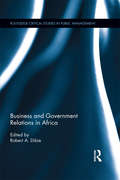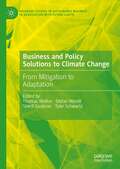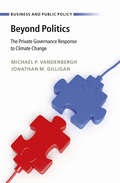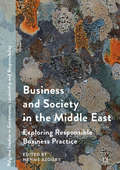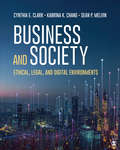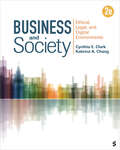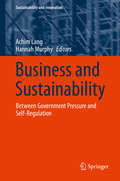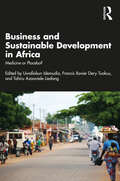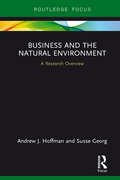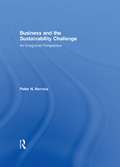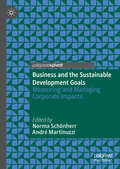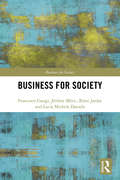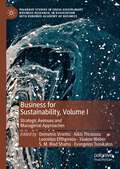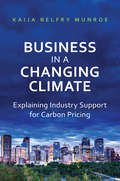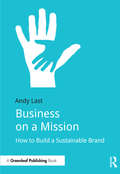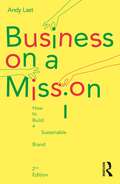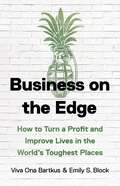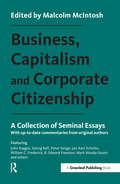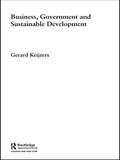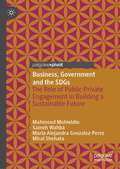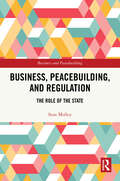- Table View
- List View
Business and Environmental Sustainability: Foundations, Challenges and Corporate Functions
by Sigrun M. WagnerEnvironmental sustainability is increasingly important to organisations, whether for regulatory, financial or ethical reasons. Business and Environmental Sustainability looks at the environmental aspect of sustainability for all organisations pursuing competitive advantage. The book provides theoretical foundations from science, economics, policy and strategy, introduces three environmental challenges (climate change, pollution and waste) and looks at how corporate functions can address these. This textbook provides a thorough foundation by introducing readers to the science, reasoning and theory behind environmental sustainability and then delves into how these ideas translate into principles and business models for organisations to use. Next, it covers environmental challenges from climate change, pollution and waste, and then goes on to examine the different corporate functions (from supply chain management to human resources) to illustrate how environmental sustainability is managed and put into practice in organisations. Finally, a set of integrative case studies draws everything together and enables the reader to apply various analytical tools, with the aim of understanding how companies can not only reduce their environmental footprint but can positively contribute to environmental sustainability. Written by an award-winning lecturer, Business and Environmental Sustainability boasts a wealth of pedagogical features, including examples from a range of industries and countries, plus a companion website with slides, quiz questions and instructor material. This will be a valuable text for students of business, management and environmental sustainability and will also be suitable for broader courses on corporate responsibility and sustainability across environmental studies, political science and engineering.
Business and Government Relations in Africa (Routledge Critical Studies in Public Management)
by Robert A. DibieThis book endeavors to take the conceptualization of the relationship between business, government and development in African countries to a new level. In the twenty-first century, the interests and operations of government and business inevitably intersect all over the African continent. No government, federal or state, can afford to ignore the needs of business. But what are these needs, how does business express its needs to government and what institutions organize government-business relations in African countries? How should government regulate business, or should it choose to let the markets rule? Government and Business Relations in Africa brings together many of sub-Saharan African leading scholars to address these critical questions. Business and Government Relations in Africa examines the key players in the game—federal and state governments and business groups—and the processes that govern the relationships between them. It looks at the regulatory regimes that have an impact on business and provides a number of case studies of the relationships between government and economic development around the African continent, highlighting different processes and practices. It shows the latest state of knowledge on the topic and will be of interest both to students at an advanced level, academics and reflective practitioners. It addresses the topics with regard to business-government relations and will be of interest to researchers, academics, policymakers, and students in the fields of African politics, comparative politics, public policy, business and politics, sustainable development and sustainability, economic development, and managerial economics.
Business and Policy Solutions to Climate Change: From Mitigation to Adaptation (Palgrave Studies in Sustainable Business In Association with Future Earth)
by Thomas Walker Sherif Goubran Stefan Wendt Tyler SchwartzThis edited book aims to ignite both an academic and practitioner-oriented discussion regarding the question how the business and government sector can adapt to today’s fast-changing climate. Specifically, the collection seeks to explore how businesses and policy makers can prepare for a world where freshwater is scarce, extreme weather events are common, floods and wildfires are frequent, and global sea levels rise by more than two meters. In addition to assessing incremental approaches, it explores strategies that employ interdisciplinary and innovative solutions to climate change adaptation. The chapters included in this book examine and propose business and policy solutions for climate-induced economic, technical, urban, and societal challenges. It draws on an international range of prominent authors and, therefore, will be of interest for academics and practitioners working in the field of sustainability management, sustainable finance, sustainable operations management, food management, strategy, and environmental management. It can also serve as a valuable guide for practitioners and policymakers in those fields.
Business and Public Policy: The Private Governance Response to Climate Change (Business and Public Policy)
by Michael P. Vandenbergh Gilligan Jonathan M.Private sector action provides one of the most promising opportunities to reduce the risks of climate change, buying time while governments move slowly or even oppose climate mitigation. Starting with the insight that much of the resistance to climate mitigation is grounded in concern about the role of government, this books draws on law, policy, social science, and climate science to demonstrate how private initiatives are already bypassing government inaction in the US and around the globe. It makes a persuasive case that private governance can reduce global carbon emissions by a billion tons per year over the next decade. Combining an examination of the growth of private climate initiatives over the last decade, a theory of why private actors are motivated to reduce emissions, and a review of viable next steps, this book speaks to scholars, business and advocacy group managers, philanthropists, policymakers, and anyone interested in climate change.
Business and Society in the Middle East: Exploring Responsible Business Practice (Palgrave Studies in Governance, Leadership and Responsibility)
by Nehme AzouryThis book discusses the unique relationship between societies and businesses in the Mediterranean region, with contributions from public figures and academics from Middle Eastern and Arab societies, as well as from North America and Europe. This blend of expertise and knowledge focuses on common business practices and their effect on society in Mediterranean countries, and aims to create a bridge between the two. Considering the cultural, social, political, legal and economic impacts and variety, Business and Society in the Middle East is a contemporary and authentic view of how local and traditional aspects of society dictate diversity and homogeneity within businesses.
Business and Society: Ethical, Legal, and Digital Environments
by Sean P. Melvin Cynthia E. Clark Kabrina K. ChangRecipient of a 2021 Most Promising New Textbook Award from the Textbook & Academic Authors Association (TAA) Business and Society: Ethical, Legal, and Digital Environments prepares students for the modern workplace by exploring the opportunities and challenges they will face in today′s interconnected, global economy. The author team discusses legal and ethical issues throughout and uses real-world cases to provide students with a holistic understanding of stakeholder issues. Chapters on social media and citizen movements, big data and hacking, and privacy in the digital age provide in-depth coverage of how technology is transforming the relationship between organizations and consumers. Included with this title: The password-protected Instructor Resource Site (formally known as SAGE Edge) offers access to all text-specific resources, including a test bank and editable, chapter-specific PowerPoint® slides.
Business and Society: Ethical, Legal, and Digital Environments
by Sean P. Melvin Cynthia E. Clark Kabrina K. ChangRecipient of a 2021 Most Promising New Textbook Award from the Textbook & Academic Authors Association (TAA) Business and Society: Ethical, Legal, and Digital Environments prepares students for the modern workplace by exploring the opportunities and challenges they will face in today′s interconnected, global economy. The author team discusses legal and ethical issues throughout and uses real-world cases to provide students with a holistic understanding of stakeholder issues. Chapters on social media and citizen movements, big data and hacking, and privacy in the digital age provide in-depth coverage of how technology is transforming the relationship between organizations and consumers. Included with this title: The password-protected Instructor Resource Site (formally known as SAGE Edge) offers access to all text-specific resources, including a test bank and editable, chapter-specific PowerPoint® slides.
Business and Society: Ethical, Legal, and Digital Environments
by Cynthia E. Clark Kabrina K. ChangRecipient of a 2021 Most Promising New Textbook Award from the Textbook & Academic Authors Association (TAA) Business and Society: Ethical, Legal, and Digital Environments, Second Edition prepares students for the modern workplace by exploring the opportunities and challenges that individuals and businesses face in today′s increasingly global and digital world. Authors Cynthia E. Clark and Kabrina K. Chang present unique chapters on social media, big data and hacking, and privacy, diving deeper into the new legal and ethical challenges that are unleashed by our society′s use of and dependence on technology. Real-world case studies, ethical dilemmas, and point-counterpoint debates provide students with hands-on opportunities to apply chapter concepts and develop critical thinking skills as they explore the relationship among businesses, their stakeholders, and their shareholders. The Second Edition includes new cases and expanded coverage of global issues, the future of work, artificial intelligence and consumer rights.
Business and Society: Ethical, Legal, and Digital Environments
by Cynthia E. Clark Kabrina K. ChangRecipient of a 2021 Most Promising New Textbook Award from the Textbook & Academic Authors Association (TAA) Business and Society: Ethical, Legal, and Digital Environments, Second Edition prepares students for the modern workplace by exploring the opportunities and challenges that individuals and businesses face in today′s increasingly global and digital world. Authors Cynthia E. Clark and Kabrina K. Chang present unique chapters on social media, big data and hacking, and privacy, diving deeper into the new legal and ethical challenges that are unleashed by our society′s use of and dependence on technology. Real-world case studies, ethical dilemmas, and point-counterpoint debates provide students with hands-on opportunities to apply chapter concepts and develop critical thinking skills as they explore the relationship among businesses, their stakeholders, and their shareholders. The Second Edition includes new cases and expanded coverage of global issues, the future of work, artificial intelligence and consumer rights.
Business and Sustainability: Between Government Pressure and Self-Regulation (Sustainability and Innovation)
by Achim Lang Hannah MurphyDemands for sustainability policies have set new challenges for business both on the individual firm level and on the level of organized business interests. This edited volume brings together economic, social, environmental, and cultural dimensions of sustainability that comprise different challenges for business processes and activities. The aim is to develop an overarching framework to the study of sustainability and business and to advance an interdisciplinary analytical perspective. The book establishes a balanced account that equally represents business as problem causers as well as problem solvers, and therefore responds to the urgent need to investigate the intersection between sustainability issues and business participation.
Business and Sustainable Development in Africa: Medicine or Placebo?
by Uwafiokun Idemudia, Francis Xavier Dery Tuokuu, and Tahiru Azaaviele LiedongThe book offers new critical insights into the relationship between corporate social responsibility (CSR) and sustainable development in Africa. The extent to which CSR initiatives can contribute to sustainable development in Africa remains debatable. This book examines in a very clear structure how, when, and whether CSR initiatives are able to contribute to the realization of the sustainable development goals, peace, and environmental sustainability at the micro-levels of society. It also explores some macro-level issues such as the relationship between taxation and CSR, CSR and human rights, and CSR and public governance and, in so doing, challenges existing CSR dogmas. With themes aligned with the UN Sustainable Development Goals (SDGs), this book provides useful practical guidance for policymakers and business leaders seeking to better understand the strength and limitations of CSR as a vehicle for advancing sustainable development in Africa. It will also appeal to scholars, researchers, and students of African studies, development studies, international business, strategic management, and business and society.
Business and the Natural Environment: A Research Overview (State of the Art in Business Research)
by Andrew J. Hoffman Susse GeorgThe fields of corporate environmentalism, green business and corporate sustainability have grown significantly over the past twenty-five years, such that the academic research domains of business decision-making, accounting, organizational behaviour, and the protection of the natural environment have developed into maturing areas of study within the management sciences. Business and the Natural Environment: A Research Overview is a summary of the research thus far on this topic, offering a structure for understanding its emergence and growth, the multiple facets that make up its present state and a glimpse into the future of where it may be going. Along the way, the authors provide a compendium of its important works to help situate the interested reader in the landscape of the field. One important element of this work is its topical relevance; issues of environmental protection (and more recently sustainability) are critically important in today’s worlds of business, policy, and public understanding. Scholars who choose to enter this domain have much to offer of societal value while at the same time, entering a non-fully legitimate research stream that can lead to academic success (such as tenure). This shortform book provides a research map for both new scholars who wish to enter the field and more seasoned researchers who wish to understand one view of the landscape and how they might fit within it. This expert survey of the existing literature brings the research story into the age of the Anthropocene and is essential primary reading.
Business and the Sustainability Challenge: An Integrated Perspective
by Peter N. NemetzIt is vitally important for businesses to have a holistic understanding of the many issues surrounding and shaping sustainability, from competitors to government and political factors, to economics and ecological science. This integrated textbook for MBA and senior-level undergraduates offers a comprehensive overview of the issues of sustainability as they relate to business and influence corporate strategy. It also features a wide range of cases and an extensive discussion of tools to incorporate sustainability issues into strategic decision making, helping instructors and students to build and then apply a solid understanding of sustainability in business.
Business and the Sustainable Development Goals: Measuring and Managing Corporate Impacts
by André Martinuzzi Norma SchönherrThis innovative and engaging book discusses the contribution of business to the Sustainable Development Goals (SDGs) adopted by the United Nations in 2015. It critically analyses selected impact measurement and management tools to highlight their respective benefits and limitations, and also provides guidance on critical management decisions to support high-quality impact measurement and management. The analyses underlying this book are the result of a three year research project conducted by an international consortium in the EU-funded research project GLOBAL VALUE – Managing Business Impact on Development. The research is complemented by examples from corporate practice and expert interviews to demonstrate and measure the contribution of business to sustainable development in the context of the SDGs.
Business as an Instrument for Societal Change: In Conversation with the Dalai Lama
by Sander TidemanBusiness as an Instrument for Societal Change: In Conversation with the Dalai Lama is the result of two decades of research and dialogue with His Holiness the Dalai Lama and other leaders in business, government, science and education. Author Sander Tideman, a lawyer and banker who has maintained a friendship with the Dalai Lama over all these years, presents a practical framework and methodology to develop a new kind of leadership - one fit to repurpose the business world and tackle escalating social, economic and environmental needs. The Dalai Lama rarely speaks directly on the topics of business, leadership and economics. Yet in the dialogues recounted here, his wisdom - combined with key insights from business and public leaders -creates a unified shift towards a consciousness of interconnectedness, offering profound insights for practitioners and general readers alike. Tideman unites the scientific worldviews of physics, neuroscience and economics with the positive psychology of human relationships, and ancient spiritual wisdom, to formulate practical business leadership solutions. While recognizing the need for change in external structures and governance, Tideman highlights the importance of opening our minds, and connecting inner and outer spirituality. At the same time, he focuses on concrete practices for winning the hearts and minds of employees, customers, communities, and society at large, while addressing deep-rooted problems such as extreme social inequality and continued financial collapses. At the heart of this book lies the journey to discover our shared purpose. This ignites new sources of value creation for the organisation, customers and society, which Tideman terms 'triple value'. We can achieve triple value by aligning societal and business needs, based on the fundamental reality of interconnection. Business as an Instrument for Societal Change: In Conversation with the Dalai Lama is a readable and intelligent exploration of how leaders can actually help to shape a sustainable global economy by embracing innate human and humane behaviour. It is also Tideman's fascinating personal journey, which brought him to question the underlying motivations and goals of business leadership and to seek a new paradigm for a more sustainable approach. Reflecting Tideman's sharp perceptions and infused with the Dalai Lama's unmistakable joy, this book has the power to change your way of thinking.
Business for Society
by Jérôme Méric Lucia Michela Daniele Rémi Jardat Francesco GangiThis book is about promoting corporate responsibility in its original meaning: businesses should have a positive impact on society, and society should not only be a lever of making a profit. When we treat social responsibility as an external function of the core business, we are exposed to the worst. Business for Society seeks to redress the balance and promotes the original idea of corporate responsibility. This first book in the series of the same name sets the scene and presents the key theories across the various management disciplines to answer the following questions: ‘How, why and under what conditions can business act for society?’ The book narrows and discusses examples of businesses which are making impressive strides in delivering positive impacts for society as well as their bottom lines; but as the concept of corporate responsibility has become more mainstream in recent years, many organisations have adopted the term and reduced it to a marketing message. Areas covered include a historical perspective on the hijacking of business responsibility towards society, management knowledge and value, the Business for Society project against hijacking, accounting for society, finance for society and governance for society and democracy. The book will be of interest for scholars and students in the fields of corporate social responsibility, business ethics and governance.
Business for Sustainability, Volume I: Strategic Avenues and Managerial Approaches (Palgrave Studies in Cross-disciplinary Business Research, In Association with EuroMed Academy of Business)
by Leonidas Efthymiou Demetris Vrontis Yaakov Weber Alkis Thrassou Evangelos Tsoukatos S. M. Riad ShamsPart of a two-volume work, this book explores how businesses shape, and are shaped by, sustainability forces and phenomena. These evolutionary transformations have driven scholars, practitioners and decision makers to pay increased attention to sustainability as an integral part of business development. Consequently, and congruently, companies, organisations and governments are modifying their philosophy, processes, activities, and communications, at both the micro- and macro-foundational levels, to comply and adapt to the new realities.Reflecting the purpose of the series, both volumes offer a cross-section of multi-disciplinary perspectives within business studies. Volume 1 focuses on strategic and managerial approaches to sustainability in business, including accounts on the historic origins of sustainability and its contemporary corporate sustainable models. Volume 2 explores, more contextually, how business and social sustainability constitute indivisible and inextricable components of the same nexus. Taken together, they offer an original perspective on how businesses can help achieve the SDG goals and targets.
Business in a Changing Climate: Explaining Industry Support for Carbon Pricing
by Kaija Belfry MunroeClimate change skeptics and business pundits alike are convinced that any public policy instruments used to curtail environmental degradation are antithetical to the interests of the corporate community. However, many companies have actually come out in favour of carbon pricing. In Business in a Changing Climate, Kaija Belfry Munroe examines this counterintuitive action and, in doing so, explains how large firms determine their preferences for public policy options. Her analysis of thirteen industrial associations and seventeen firms from industries such as petrochemical, forestry, mining, and steel, reveals that, despite the higher costs, these industries prefer carbon pricing over voluntary agreements. Based on enlightening interviews with executives, government, and NGO officials, Belfry Munroe argues that the acceptance of climate change policy by companies is determined by the risks posed to capital investments and investor concern. Business in a Changing Climate is the first book to ask major pollution emitting industries in Canada what their preferences are with respect to climate change.
Business on a Mission: How to Build a Sustainable Brand
by Andy LastBronze winner of the AXIOM Business Book Award in the category of Philanthropy, Non-Profit, Sustainability. Please see: http://www.axiomawards.com/77/award-winners/2017-winners This easy-to-read and engaging book is the perfect introduction to how to build a sustainable brand for your organization. Intended as a roadmap that can be readily applied by busy managers and practitioners, the book includes interviews with business leaders, including Paul Polman of Unilever, Adam Elman of Marks & Spencer, and Jonas Prising of ManpowerGroup to provide insight into best practice and clear guidance for implementation. Throughout, the book avoids jargon and theorizing to ensure readability. Business on a Mission is based on more than a decade working with some of the first businesses to develop social missions and shows the foundations behind their success. It looks at how businesses can profit from working hand in hand with society and identifies a model for success. The book demonstrates how businesses can go from hiding behind "social shields" to picking up "social swords" and presents the six criteria to look for in assessing a social mission. It also focuses on how good communications can build trust and bring about positive change; and it provides clear ways to engage employees and improve productivity as well as "rules" for communicating social missions externally. This optimistic book explains the benefits of partnerships in the sustainable development agenda, particularly between businesses and NGOs. The book features guidelines for avoiding dysfunctional partnerships, and presents interviews with Marc Van Ameringen, Executive Director of GAIN (Global Alliance for Improved Nutrition) 2005 to 2016, and Myriam Sidibe, Social Mission Director for Africa, Unilever, on how things can be managed to the benefit of both partners. .
Business on a Mission: How to Build a Sustainable Brand
by Andy LastBusiness on a Mission is a simple to follow guide for how organisations can adapt to the changing world and evolving expectations of stakeholders to build more purpose-led, sustainable businesses. It features proven models and case study examples of how to create a brand that talks to the emerging Gen Z consumer base; how to use social missions to drive sales in retail and with B2B customers; how to preserve reputation and licence to operate by working in partnership with not-for-profit organisations; and how to attract and retain the best talent by demonstrating a genuine social purpose. As well as clear, applicable models and behind-the-scenes descriptions of how successful campaigns were built and sustainable change made, this book features candid interviews with change makers from the worlds of retail, professional services, consumer goods, and NGOs. This second edition looks at how businesses and brands like Dove are now linking social and environmental goals, with an exclusive interview with Unilever CEO, Alan Jope. It explores how investors are now driving a systemic change in focus in the boardroom towards the sustainability agenda, and how leaders can respond to this, featuring a new interview with Frank Cooper, Global Chief Marketing Officer and member of the Global Executive Committee at BlackRock. The impact of the pandemic on what it means to be a sustainable brand, including a focus on sustainable supply chains, the growing power of Gen Z, the growth of online purchasing, multi-stakeholder partnerships, increased regulation, and culture at work, is also explored. This book has been read, enjoyed, and used by business leaders to identify models for change; by managers to create progressive campaigns; by NGOs to create stronger partnerships with the private sector; and by students to learn how theories of social purpose and sustainability can be applied in the real world. The first edition was Bronze winner of the AXIOM Business Book Award in the category of Philanthropy, Non-Profit, Sustainability.
Business on the Edge: How to Turn a Profit and Improve Lives in the World's Toughest Places
by Viva Ona Bartkus Emily S. BlockA road map for how businesses can grow and make money while reducing poverty and conflict in some of the world&’s most challenging environments Many companies worry that expanding into emerging markets is a risky—and even dangerous—move. Professors Viva Ona Bartkus and Emily S. Block see things differently. They argue that by entering markets in the world&’s frontline regions—areas stuck in cycles of violence and extreme poverty—businesses can actually create stability and expand opportunity for communities and corporations alike. From helping Colombian farmers transition from growing coca to produce to disrupting human trafficking rings by creating more construction jobs in the Philippines, Business on the Edge proves that businesses can make money while advancing corporate social responsibility, environmental conservation, and social justice. Partnering with groups including multinational companies, NGOs, and the US military, Bartkus and Block outline their process for generating opportunities, detailing their successes and failures in launching over eighty growth-oriented business solutions in thirty countries. Bridging the gap between academic research and real-world experience, Business on the Edge shows how businesses can reduce risks, cut costs, and increase profits, all while creating economic opportunities that transform communities.
Business, Capitalism and Corporate Citizenship: A Collection of Seminal Essays
by Malcolm McIntoshIn the first decades of the twenty-first century, the theory and practice of corporate citizenship and responsibility adapted significantly. The pieces in this volume capture the essence of these changes, with illuminating reflections by their preeminent authors on success, failure, learning and progress. Featuring contributions from John Ruggie, Peter Senge, R. Edward Freeman, Jan Aart Scholte and Georg Kell, it charts the rise of corporate citizenship, sustainability and corporate social responsibility. This title is one of a two-volume set: a collection of seminal and thought-provoking essays, drawn from the Journal of Corporate Citizenship’s archive, accompanied by new analysis and reflection from the original authors. Written by some of the most widely recognized academic and business pioneers and leaders of the corporate responsibility and global sustainability movement, the volumes make essential reference texts for anyone interested in the radically awakening new global political economy. The Journal of Corporate Citizenship was launched in 2001 by Founding Editor Malcolm McIntosh and Greenleaf Publishing. Today, it continues to fulfil its mission to integrate theory and practice and provide a home for enlightened transdisciplinary thinking on the role of business and organizations in society.
Business, Government and Sustainable Development (Routledge Advances In Management And Business Studies #Vol. 28)
by Gerard KeijzersThe range of sustainability objectives has now developed from relatively simple issues of environmental protection to a full array of interwoven social, economic and ecological issues, nationally and internationally. The involved process of sustainable development has now become a permanent and increasingly complex process. In this insightful book,
Business, Government and the SDGs: The Role of Public-Private Engagement in Building a Sustainable Future
by Sameh Wahba Maria Alejandra Gonzalez-Perez Mahmoud Mohieldin Miral ShehataThis book seeks to revise and challenge the roles and traditional realms of influence that national and local governments, and businesses at a critical juncture in terms of achieving sustainable development, faces when tackling the dual challenges of climate change and post-COVID recovery. Using the broader lens of the 2030 UN Sustainable Development Goals (SDGs) to assess the roles and responsibilities of each of these stakeholders and their relationships, the book offers policy, economic arguments, case studies and examples to argue that neither national or local governments, nor companies, could afford to deviate from the SDGs in the recovery from the current crisis, nor that the imperative of bold climate action should detract from the broader focus on sustainability. The analysis frames the debate of how a balance between people, planet, and profits can be achieved and how nations, regions and cities, and businesses, with their representative organizations, can achieve a sustainable recovery from the current global crisis, and contribute to climate smart, resilient and inclusive development.
Business, Peacebuilding, and Regulation: The Role of the State (Business and Peacebuilding)
by Sean MolloyThis book examines the relationship between business-based peacebuilding and the opportunities that emerge from the pluralisation of regulation. The core message is, notwithstanding the broad range of regulatory initiatives and actors that exist in conflict-affected settings, the state should assume responsibilities for defining the types of contribution that business can and ought to make to peace. It also demonstrates how the state, through different forms and methods of regulation, is well-placed to engage businesses to do so. It is particularly concerned with the potential for regulation to help address what is identified as a state of optimistic uncertainty in the field of business and peacebuilding. On one level, there is a sense of optimism around the types of contributions that businesses can and often do make as agents for peace. On another, there are varying degrees of uncertainty surrounding the actual peacebuilding impacts of business activities; how businesses are to understand the ways in which to make these contributions, and why businesses would do so. Regulation, this book will argue, can play an important role in bridging the chasm between optimism and uncertainty. This book will be of interest to those engaged not only with business and peacebuilding but also business and human rights, business and development and business and the environment. Moreover, this book is also of contemporary interest in other ways – the aftermath of the Ukranian conflict, as an example, will require a concerted effort to rebuild that society after war. Private sector actors could be a powerful vehicle for reconstruction and development and this book examines how regulation can be used to facilitate businesses involvement in peacebuilding efforts.
